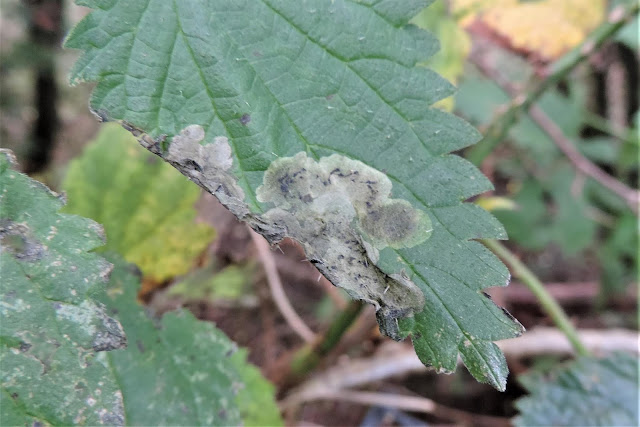The hoverfly season is all but over until next March or April depending on how bad a winter we get, with Ivy now being about the only food source left for flies outside the urban ornamental gardens. So I had a look at the Ivy along the lane to the sewage works and the lane leading from Llangynwyd past the viaduct and up to the entrance to Cwm Darren Woods. I wasn't expecting much as although it was bright the areas with Ivy were in the shade and made photography almost impossible. As it was I managed to record a healthy 9 species for the time of year. The surprise was at Lletty Sewage Works lane where small patches of flowering Ivy had a few migrants in a single of Xanthandrus comtus (*), Scaeva pyrastri (*) and 2 Episyrphus balteatus, there was also a Eristalis pertinax present. At the viaduct lane there was much more Ivy in bloom and I recorded Melanostoma scalare (2)(*), Platycheirus albimanus (4), Platycheirus scutatus s.l. (1), Episyrphus balteatus (7), Meliscaeva cinctella (1)(*), Syrphus ribesii (2)(*) and Eristalis pertinax (6)(*). Six of these species were my latest dates for the year and are marked with an "*". I also had another Eristalis "similis" type, but without a photo for confirmation I'll just have to record as "Eristalis species" with a footnote explain why it could have been "similis". The X. comtus was probably my last new hoverfly for the year, giving me a total of 101 species + what's new in my specimens (2017 = 106 species).
Other insects were a little scarce although I did have another Hornet feeding on Ivy at Lletty Woods as well as 10-20 Common Wasps and a single Honey Bee. The only bird of note was a female Sparrowhawk.
Episyrphus balteatus - the dark orange colour instead of yellow would suggest this one hatched in UK rather than being a migrant.(darker colour in cooler conditions, brighter, yellow colour in warmer conditions)
Another fly leaf-mine, this time on Nettle - Agromyza pseudoreptans/reptans agg. (can only be distinguished by the differences in the larva, although pseudoreptans is the commoner/default species)


No comments:
Post a Comment